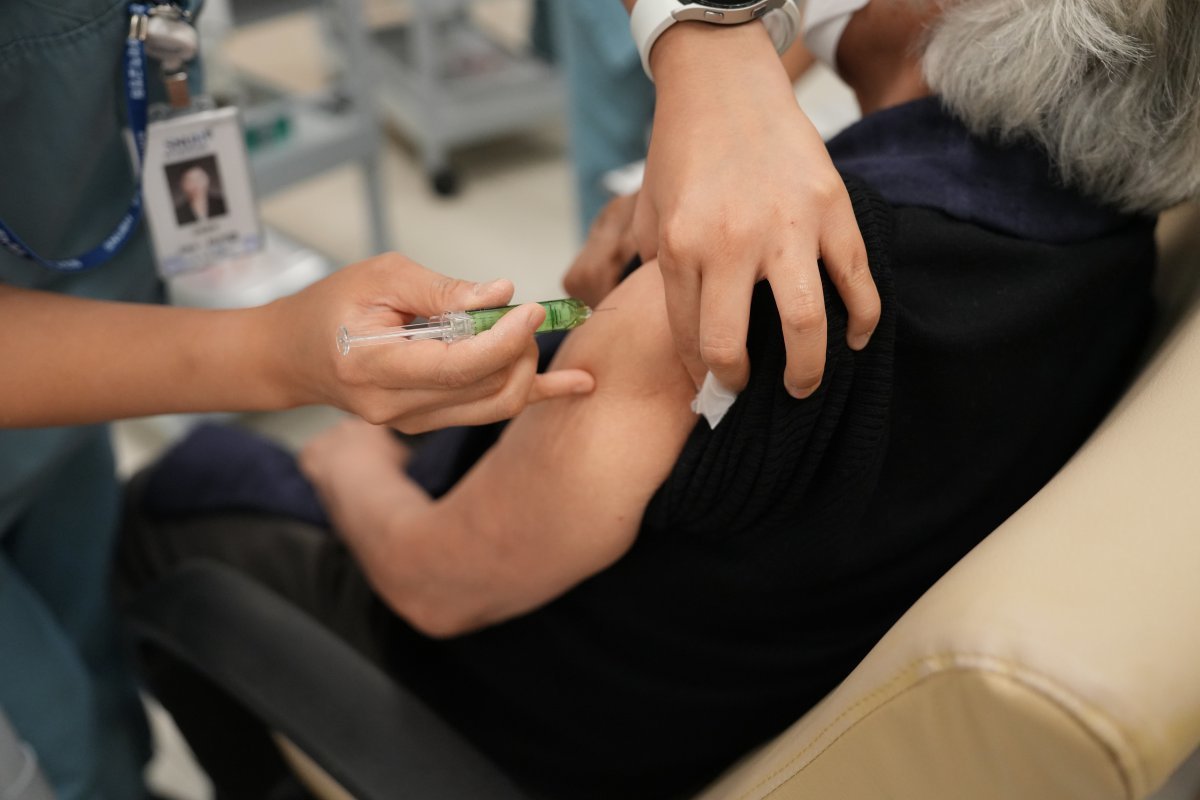[인플루엔자]
Risk of complications from the flu… Every year you develop a cold and need a new vaccine.
[폐렴사슬알균]
Causes of pneumonia and meningitis… Free 23-valent vaccine for people over 65 years of age
[대상포진]
Rash – very painful with blisters … The protective effect is very good, so 5060 is essential.
[파상풍-디프테리아-백일해]
Muscle paralysis, brain damage, and in extreme cases, death… If you raise a child, you must get vaccinated.
《Four vaccines that seniors and the elderly need to get
As the temperature drops recently, now is the time when people with weakened immune systems need to be careful. The immune system that protects the body becomes more vulnerable as we age. In particular, people over 60 often suffer from chronic diseases that occur when their immune system is weakened, such as cardiovascular disease, diabetes, chronic kidney disease, and lung disease. chronic In addition, when contracting an infectious disease such as the flu, the risk of developing a serious condition, such as hospitalization, increases. Experts agree that vaccination in old age is the most important thing to prevent serious diseases. With the help of Professor Lee Ki-heon from the Department of Family Medicine at Seoul National University Bundang Hospital, we took a close look at the four vaccines that must be given to the elderly.》
● The first priority for vaccination is the influenza (flu) vaccine.
Flu is called flu in Korean, which is common every year from winter to next spring. In people older than 60 years, complications such as pneumonia due to the flu appear more often, and there are many cases where the disease progresses to a very serious condition that requires go to the hospital. However, if you get the flu vaccine, your chance of getting the flu will decrease by 60-80%. Also, even if you catch it, the chances of it developing into a serious condition or complications are greatly reduced.
It is best to get an influenza vaccine by December each year at the latest. Also, as the virus progresses, a new vaccine must be given each year. However, you should not get the flu vaccine if you have a severe allergy to gelatin, antibiotics, or eggs, or if you have previously been diagnosed with Guillain-Barré syndrome. Also, if you are suffering from a moderate or severe illness, it is best to get the vaccine after your condition has improved. If you have a mild cold without a fever, there is no need to delay getting the vaccine.
● Pneumococcal vaccine is the second priority for vaccination.
Pneumonia refers to inflammation of the lungs. Pneumonia can occur due to a number of causes, including bacteria, viruses, fungi, parasites, and radiation. Streptococcus pneumoniae is not only the main cause of pneumonia, but also causes diseases such as sinusitis, otitis media, meningitis, and bacteremia. When infected with Streptococcus pneumoniae, the mortality rate is about 5-7% for pneumonia, 25-30% for bacteremia, and 30% for meningitis, but receiving the pneumococcal vaccine greatly ‘ reduce the possibility of disease.
There are three types of pneumococcal vaccine: 13-valent, 15-valent, and 23-valent. The 13-valent vaccine prevents about 75% of invasive diseases such as meningitis and bacteremia. Non-invasive diseases such as pneumonia are prevented by around 45%. The 23-valent vaccine also prevents 50 to 80% of invasive diseases. When it comes to the pneumonia vaccine, it is best to get the 13-valent or 15-valent vaccine, and then get the 23-valent vaccine at least 8 weeks later. People over the age of 65 can get the 23-valent vaccine for free with government support. A 20-valent vaccine will be introduced in Korea early next year, and only one dose is expected to be effective.
● Shingles vaccine, 3rd priority vaccination
The varicella-zoster virus is first contracted as a child in the form of chicken pox and then it lies in the ganglia. However, shingles is a disease that occurs when a latent virus reactivates as you age or have a weakened immune system. It is characterized by severe pain and rash and blisters that appear on the skin throughout the ganglion. Even if the rash is gone, chronic pain known as ‘postherpetic neuralgia (PHN)’ will still bother you if your immune system is weak. If you are over 50 or over 60 and have not yet received the shingles vaccine, it is recommended that you do. There are two types of shingles vaccine: a live vaccine, which is given only once, and an inactivated vaccine, which requires two injections, 2 to 6 months apart. The killed vaccine is the latest vaccine introduced in Korea in December 2022. According to overseas clinical studies, the effectiveness of killed vaccines in preventing shingles is reaching 97.2% in people over 50 years old and 89.8% in people over 70 years old. It has a stronger protective effect than live vaccines, but it is three times more expensive.
● Tetanus-diphtheria-pertussis vaccine is the 4th priority vaccine.
Tetanus is a disease in which tetanus bacteria enter the body through a contaminated wound. Your muscles may become paralyzed, leaving you unable to move your mouth, swallow saliva, or stop breathing, leading to death. Diphtheria is a disease that is transmitted by diphtheria bacteria entering the respiratory tract or coming into contact with the skin. Swelling can occur in the pharynx and tonsils, and in severe cases, the airways can be blocked, making it difficult to breathe properly, and swelling can occur in the heart muscle. It is also a serious disease that can cause death if symptoms worsen. Whooping cough is a disease in which pertussis bacteria enter the respiratory tract and cause severe coughing attacks, which can lead to complications such as pneumonia, convulsions, brain damage and even death. It has been popular this year, with a total of 30,332 patients from the first week of November, which is 104 times higher than the total number of patients last year (292).
All three diseases can be prevented with a single dose of vaccine. The vaccine is 99% effective in preventing tetanus and diphtheria, and 80% effective against whooping cough. This effect lasts for about 10 years. In Korea, basic vaccination is usually completed in childhood, and additional vaccination is required at 10-year intervals in adulthood. Vaccination is also recommended for parents and grandparents who are raising babies and young children. This is because babies and young children are more likely to be infected than adults.
Jinhan Lee, medical reporter and doctor [email protected]
-
- great
- 0a dog
-
- i am sad
- 0a dog
-
- i am angry
- 0a dog
-
- I recommend it
- a dog
Good news now
2024-11-13 18:00:00
#Immunity #drops #due #cold #wind.. #Preparing #diseases #vaccination


